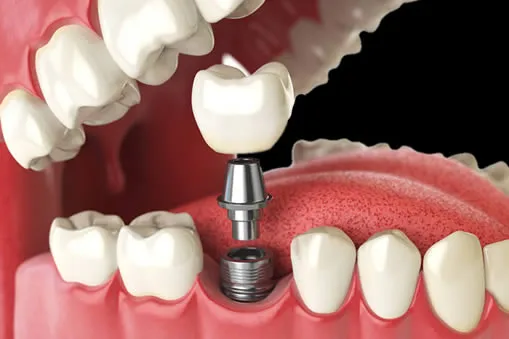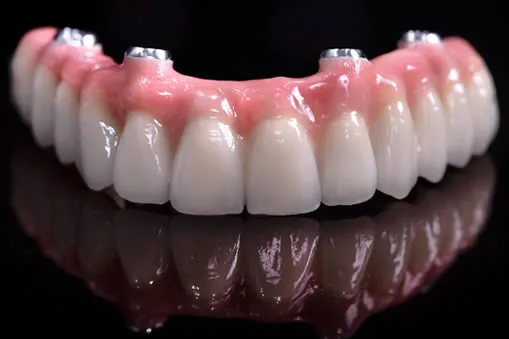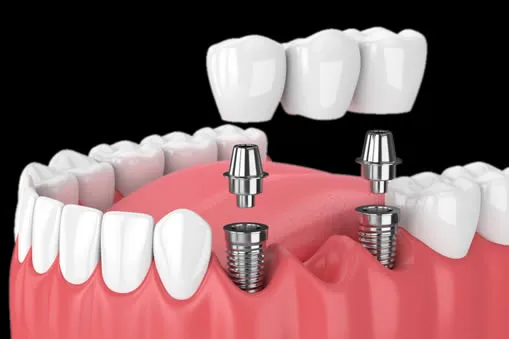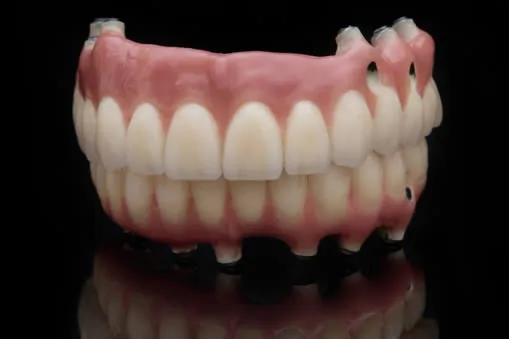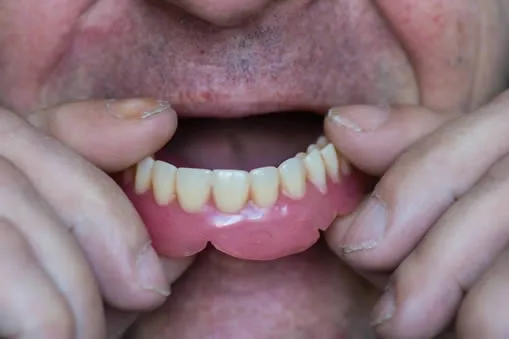Dental implants have revolutionized the field of dentistry, offering a permanent and natural-looking solution to missing teeth. Unlike traditional dentures or bridges, dental implants are designed to look and feel just like natural teeth, providing patients with a comfortable and reliable solution to tooth loss. Whether you’ve lost teeth due to injury, decay, or other factors, dental implants can restore your smile, improve your oral health, and enhance your quality of life.
Dental implants are the best way to replace a missing tooth or multiple missing teeth
Missing teeth can cause a range of dental issues, from difficulty chewing and speaking to bone loss in the jaw and shifting of surrounding teeth. While there are several options available for replacing missing teeth, dental implants are widely considered to be the most effective solution.
Dental implants are artificial tooth roots that are placed directly into the jawbone, providing a stable foundation for a replacement tooth or teeth. This procedure involves minor surgery, during which a small titanium post is placed into the jawbone to replace the natural tooth root. Once the post is in place, a natural-looking dental crown is attached to the top, completing the restoration of the missing tooth.
One of the main benefits of dental implants is their durability and longevity. Unlike other tooth replacement options, such as bridges or dentures, dental implants are designed to last a lifetime with proper care and maintenance. They also offer superior comfort and stability, as they are anchored directly into the jawbone, allowing for a more natural look and feel. Additionally, dental implants can help to preserve the jawbone by stimulating bone growth, which can prevent further bone loss and maintain the structure of the face.
Dental implants offer a permanent solution to missing teeth that can improve both the function and appearance of your smile.
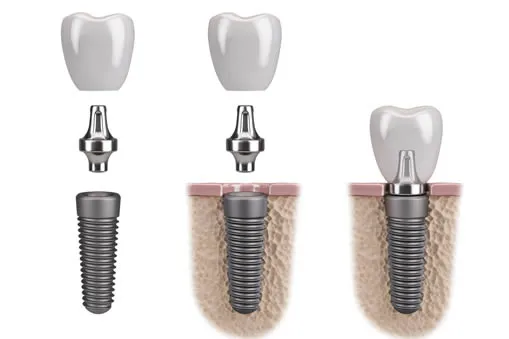
Dental Implant Options
Single Dental Implants
Single dental implants are an effective solution for replacing a single missing tooth. After the implant has integrated with the jawbone, a custom-made crown is attached to the post, creating a natural-looking and functional replacement tooth. Single dental implants not only restore the aesthetics of a missing tooth, but also improve the functionality of the mouth and prevent surrounding teeth from shifting.
Implant Supported Dentures
Implant-supported dentures are a popular and effective solution for those who have lost most or all of their natural teeth. Unlike traditional dentures, which rely on suction or adhesives to stay in place, implant-supported dentures are anchored to dental implants, providing a stable and secure fit. This innovative dental treatment offers patients a range of benefits, including improved speech, enhanced comfort, and greater confidence when eating, smiling, and speaking.
Implant Supported Bridge
Fixed dental bridges with dental implants offer an effective solution for replacing multiple missing teeth. This type of restoration uses dental implants as the foundation for a bridge of two or more artificial teeth, creating a stable and long-lasting solution for tooth loss.
Full Mouth Dental Implants
Also known as full arch dental implants offer a comprehensive solution for patients who have lost most or all of their teeth. The procedure involves the placement of multiple dental implants throughout the entire upper or lower jaw, providing a sturdy foundation for a customized set of replacement teeth. Full mouth dental implants can dramatically improve oral function, enhance your appearance, and restore your self-confidence.

What Are The Benefits Of Dental Implants?
Improve Oral Health
- Preservation of natural teeth
- Reduced risk of gum disease
Enhanced Appearance
- Natural-looking and permanent solution
- Improved speech and comfort
Improved Bone Health
- Stimulation of natural bone growth
- Prevention of bone loss and deterioration
Improved Function and Convenience
- Restored ability to eat properly
- Elimination the need for dentures
Improved Overall Health
- Improved nutrition and digestion
- Reduced risk of health issues associated with missing teeth
Improved Speech
- Allows clear and confident speech
- No slipping or moving unlike dentures
Am I a good candidate for Dental Implants?
Good overall health: To ensure the success of dental implant surgery, it’s crucial that you are in good overall health. This means that you should not have any underlying health conditions that could interfere with the healing process, such as diabetes or heart disease.
Healthy gums and jawbone: Dental implants rely on a certain amount of healthy gum tissue and jawbone for success. If you have advanced gum disease or significant bone loss in your jaw, it may not be possible to support an implant properly, making you an unsuitable candidate.
A commitment to oral hygiene: Like your natural teeth, dental implants require regular care and maintenance to ensure longevity. If you are committed to practicing good oral hygiene and taking care of your implants, you may be a suitable candidate for the procedure.
The most effective way to determine if dental implants are right for you is to schedule a consultation with our experienced implant dentist. During your consultation, we will assess your individual needs and provide you with personalized recommendations to help you restore your smile.
If you have lost all or most of your teeth, you may be a candidate for All-on-4 dental implants.
The Advantages of Implants Over Traditional Dentures
Dental implants have several advantages over traditional dentures. First and foremost, dental implants provide a permanent solution for tooth loss. Unlike dentures that may slip or cause discomfort, implants are anchored into the jawbone, providing stability and a natural feel. This means that patients can speak, eat, and smile with confidence, without worrying about their dentures shifting or falling out.
Another advantage of dental implants is that they help to preserve the jawbone. When a tooth is lost, the bone in the jaw can begin to deteriorate over time. Dental implants mimic the natural tooth root and stimulate the bone, promoting growth and preventing further deterioration. This can help to maintain the shape and structure of the face, ensuring that patients look and feel their best.
Lastly, dental implants are more durable than traditional dentures. With proper care and maintenance, implants can last a lifetime, while dentures may need to be replaced every few years. This means that dental implants are a long-term investment in a patient’s oral health and overall wellbeing. Overall, dental implants offer a permanent, stable, and durable solution for tooth loss, with numerous advantages over traditional dentures.
ADDITIONAL FREQUENTLY ASKED QUESTIONS ABOUT DENTAL IMPLANTS
Are dental implants painful?
Are dental implants painful? Most patients report experiencing little to no pain during the dental implant procedure.
Can anyone get dental implants?
Not everyone is a suitable candidate for dental implants. Patients need to have healthy gums and adequate bone density to support the implant.
How long do dental implants last?
Dental implants are designed to be a long-term solution for tooth loss. With proper care and maintenance, they can last a lifetime.
Can dental implants be removed?
Dental implants can be removed, but it is not recommended unless absolutely necessary. This process can be complicated and may require additional surgery.
Does dental insurance cover dental implants?
Most dental insurance plans do not cover the cost of dental implants. However, some plans may cover a portion of the cost, depending on the plan and the individual’s circumstances.
Can smoking affect dental implants?
Smoking can have a negative impact on dental implants’ success rate. Smoking can increase the risk of infection and hinder the healing process.
Can dental implants be done in a single day?
In some cases, dental implants can be completed in a single day. However, this is not always possible, and it depends on the individual’s needs and circumstances.
Are there any alternatives to dental implants?
There are several alternatives to dental implants, including dentures and dental bridges. However, these options may not be as long-lasting or effective as dental implants.
What is the success rate of dental implants?
The success rate of dental implants is very high, with a success rate of over 95%. Factors that can affect the success rate include a patient’s overall health, the location of the implant, and the skill of the dental professional.
Is there an age limit for getting dental implants?
There is no age limit for dental implants. As long as a patient has healthy gums and sufficient bone density, they may be a suitable candidate for dental implants.
